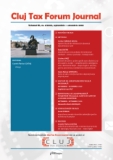EFECTELE DECIZIEI NR. 9 DIN 6 APRILIE 2020 A ÎNALTEI CURȚI DE CASAȚIE ȘI JUSTIȚIE – COMPLETUL PENTRU DEZLEGAREA UNOR CHESTIUNI DE DREPT – ASUPRA LEGII NR. 241/2005 PENTRU PREVENIREA ŞI COMBATEREA EVAZIUNII FISCALE
THE EFFECTS OF DECISION NO. 9 OF 6 APRIL 2020 OF THE HCCJ – PANEL ON CLARIFYING CERTAIN LEGAL MATTERS ON LAW NO. 241/2005 FOR PREVENTING AND FIGHTING TAX EVASION
Author(s): Cristina OneţSubject(s): Human Rights and Humanitarian Law, Law on Economics, Public Finances, Fiscal Politics / Budgeting
Published by: Editura Hamangiu S.R.L.
Keywords: tax claim; consolidated general budget; tax evasion, tax fraud;
Summary/Abstract: Starting from the content of Decision no. 9 of April 6, 2020 of the HCCJ – Panel on clarifying certain legal matters, this paper identifies the most important consequences that it may have on the scope of Law no. 241/2005 for preventing and combating tax evasion. Thus, the above-mentioned decision establishes that the revenues of the Environmental Fund do not have the legal nature of tax claims and, therefore, they do not fall under the law to combat tax evasion. The motivation on which this decision is based is that the revenues of the Environmental Fund are not regulated by the Fiscal Code and that a possible interpretation that they should be assimilated to tax claims, as they are defined in the Fiscal Code and the Fiscal Procedure Code, at the same time, is equivalent to an extensive interpretation of the incrimination norm, which would be to the detriment of the accused person, an interpretation that contravenes art. 7 of the Convention for the Protection of Human Rights and Fundamental Freedoms. Such an interpretation can be subsequently extended to any fiscal and budgetary claim that is not regulated by the Fiscal Code, a circumstance in which there will be a drastic restriction of the scope of application of Law no. 241/2005. This would signify that budget revenues such as royalties or customs duties that are not regulated by the Fiscal Code, will no longer be able to fall under the law to combat tax evasion. Considering that such a conclusion is profoundly wrong, in the first part of this paper we have demonstrated why it cannot be accepted, while in the second part of the paper we formulate a series of absolutely essential conceptual clarifications for a future regulation of how to combat tax evasion in Romania. It is a proposal to define the notions of tax evasion and tax fraud, as well as an exposition of the concepts expressed so far in the doctrine of financial law regarding these notions.
Journal: Cluj Tax Forum
- Issue Year: III/2020
- Issue No: 5
- Page Range: 27-36
- Page Count: 10
- Language: Romanian
- Content File-PDF

